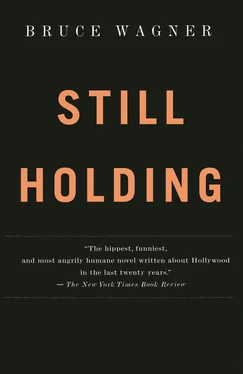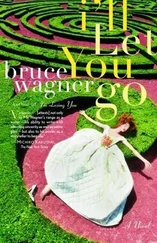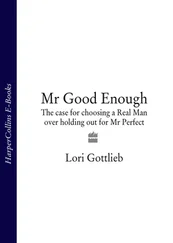At four in the morning, he emerges from the elevator and is rolled into the garage by wheelchair, flanked by doctors, nurses, and a half dozen private guards. (One has the sense the doctors are there so they can eventually boast that yes, they were present for that strange and historic release.) Burke engaged Gavin de Becker, the man who oversaw the details of George Harrison’s last days, to facilitate his son’s relocation. An armored van with blacked-out windows awaits, plus two dark Buick sedans with three men apiece.
Suddenly Kit becomes agitated.
His father, already inside the van, emerges to calm him. It takes but a few minutes. The dad gives a thumbs-up to the others and says, “Good to go.” Whatever feelings anyone has about Burke Lightfoot and his questionable motives, it is clear the man has worked hard to establish an effective, easy kinship with his volatile, traumatized son. Things would have gone a lot rougher without him.
With media none the wiser, the convoy makes the forty-minute trip to Valencia.
The facility awaits. An entire wing has been cleared.
• • •
MR. DE BECKER HAS PROVIDED round-the-clock guards on-site. Rehab employees have been screened and Tyrone Lamott, among others, duly briefed. Those immediately under him were seriously cautioned — warned — by Mr. Lamott himself that any breach of the celebrity client’s confidentiality would be harshly dealt with.
(Tabloid stories and their sources will be tracked. Photographs taken and sold will be tracked.)
Tyrone’s heart sinks when he sees Kit lifted from the truck and set in the wheelchair. He puts on that pixillated smile.
“Well hello, Mr. Lightfoot. We meet again!”
Kit says nothing. A promising laugh — then sudden Stygian hollowness of features.
“Hello, Tyrone,” says Burke, generating a kilowatt smile and a firm handshake, even in the chill of near-dawn. They’ve already met. The search for the right rehab was undertaken with the secrecy and precision of an Olympics hunt; once selected, there were many details to personally attend to.
“Hey, Mr. B — well, you made it.”
“We made it. We sure did. He made it. He’s the hero.”
“He sure is. And we’re sure happy to have you with us, Kit. There gonna be lots of people around you, twenty-four/seven, making sure you git better. Your daddy’s got hisself a room right next door to y’all so y’all won’t have time to be lonesome! We gonna have ourselves a party. Gonna have ourselves a get- well party.”
Burke nods, and one of the men pushes the wheelchair toward the building. The interior lights blaze.
“Well, well,” says Tyrone to Kit, clucking. “I thought you might at least bring Mr. Aronofsky with you.”
He’s a faggot negro that gets on Burke’s nerves — a pain-in-the-ass queen whom he nevertheless cuts some slack, knowing Tyrone is ultimately a very important player, and that their dramatic arrival has made him overwrought.
“That’s OK,” continues their sardonic host, as he rushes to keep ahead of the men. “Mr. Aronofsky isn’t here and we jus’ gonna have to deal with it. We gonna deal with everything. And we gonna have us a good time doin it, too.”
They reach the front door and Tyrone winks at Burke as they all go in.
An Actor Prepares
BECCA GOT A SMALL part in what Daily Variety called Spike Jonze/Charlie Kaufman Untitled A.K.A. Look-Alikes . Rusty got a big part, which had been kind of expected, and that was OK too, because Becca didn’t even want to think about the amount of shit she would have taken if given a commensurate role. Rusty seemed nicer now all around.
The look-alikes were scheduled for two weeks of rehearsal with Jorgia Wilding. (Rusty got privates.) The old woman was dismissive, demanding, and formidably gruff, but it was an incredible privilege to work with the legendary coach of so many greats — Al Pacino and Jessica Lange, Dustin Hoffman and Sally Field, Shelley Winters and Robert Duvall. Annie said that she’d even worked with Sofia on Godfather III.
For reasons of secrecy, scripts were mostly withheld; everyone got “sides” instead. (The pages were printed with invisible ink so they couldn’t be Xeroxed.) Decoy scripts had been circulated because the producers knew that sooner or later someone would type scenes straight onto the Internet. The look-alikes had to sign waivers stating they wouldn’t talk about the movie to friends, family, and especially the press. They’d be fired and fined if they did.
From what she had gleaned, Look-Alikes was one of those movies about the making of a movie. Becca played Drew’s camera double (which she actually would be, during the shoot. Spike came up with that idea, and Becca thought it was great because, aside from helping her get into character, she’d be paid extra too.) Her role was kind of mysterious — Charles hadn’t written her that many lines — but there was a dream sequence where she and Drew were supposed to kiss. Larry Levine said it sounded like “a postmodern Cruel Intentions thingie,” but Becca just couldn’t believe it. Her first film role and she was making out with Drew Barrymore!
She already knew some of her on-screen cohorts but got particularly friendly with the Barbra Streisand, who had a little cameo. When Becca asked if she had ever met the true Barbra, she said she’d only met Barbra’s mother, Diana Kind, on the celebrity mom segment of a defunct TV show called Photoplay. Diana had invited her home for lunch.
“So here I am in Barbra Streisand’s mother’s house. Now you can’t imagine what that was like because all my life people are telling me that I look exactly like her. And I’m gazing at the memorabilia, the framed photos and all, and it’s like I’m surrounded by my life because every image has a history — for me —you know: everyone said I looked like this one when I was twelve… and this one when I was eighteen… and this one when I was thirty. And it’s very, very strange. And I can never forget what Diana said. We were having our tea and chatting and whatnot and after a while she said that her daughter was so busy, ‘I’ll have to cart you around with me.’ Can you believe ? I saw her a lot after that — we went shopping at Robinsons-May for Barbra’s brother’s wedding present. We talked on the phone. She’d tell me how to make chicken, how you have to clean it and be careful of the germs, how you have to let it soak, then wash your hands. And the fact she was Barbra’s mom gradually kind of disappeared — she was just a person. You know, I had a feeling that she liked the idea that people thought I was her daughter. To a point, I guess. I was a missing link. It was pretty strange. People occasionally said things… like once I was waiting in the car for her and some girls walked by and said, ‘It’s Barbra Streisand!’ And Diana could hear them and I know that part of her liked that but part of her didn’t. Maybe she was thinking, But this isn ’t my daughter. Where is my daughter? This is an impersonator! Then one day I got a call from her saying she’d won an award from the Jewish National Fund. She asked me to go along, and I took my fiancé. I thought Barbra might be there, but she was in Europe at the time. It was a luncheon. There weren’t a million people. I got stared at in the elevator. I wasn’t really introduced; she never said who I was. My fiancé and I didn’t sit at the family table, but people were looking, I think, and wondering, Who is she? Barbra’s sister was there, and we took a picture — me, Barbra’s sister, and Barbra’s mom! I called to thank her and she said, ‘People didn’t know if you were Barbra, if you were a relative… ’ My feeling is that it got to the point where it was uncomfortable for her — though not for me. And when I heard she died, I just broke down. Because I always thought of getting in touch to see how she was but I never did.”
Читать дальше












